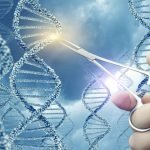A CRISPR/Cas9-based gene editing strategy was able to restore production of type VII collagen protein (C7) in skin cells from a patient with severe dystrophic epidermolysis bullosa (DEB), a study shows.
The finding shows that this method of DNA repair may be able to revert DEB-associated complications, researchers said.
The study, “Predictable CRISPR/Cas9-Mediated COL7A1 Reframing for Dystrophic Epidermolysis Bullosa,” was published in the Journal of Investigative Dermatology.
DEB is caused by mutations in the COL7A1 gene, which provides instructions for making a portion of the C7 protein. As the protein helps connect the different layers of the skin and is important for skin structure, genetic alterations in COL7A1 lead to formation of blisters and scar tissue.
DEB can be inherited in either a recessive or dominant pattern. Patients with recessive DEB (RDEB) must inherit two copies of disease-causing mutations — one from each parent — to have the disease. Current treatments focus on symptom relief and blister prevention.
One promising treatment approach is genome editing, which has been successfully used in several strategies to edit the genetic makeup of skin cells called keratinocytes. One technique of gene editing is CRISPR/Cas9, an approach that allows scientists to “cut and paste” targeted gene parts to remove, alter or add DNA.
Researchers in Austria designed a CRISPR/Cas9-based targeting strategy to correct the COL7A1 gene. To test the approach, they generated a cell line from a female patient with a severe form of RDEB. She carried a homozygous mutation, meaning in both gene copies, in exon 73 that resulted in almost complete absence of C7 production and secretion from cells. (Exons are the parts of genes containing information to make proteins.)
The scientists identified a precise target site in exon 73. A small piece of DNA containing the nucleotide adenine (one of the four building blocks of DNA) was inserted to restore the reading frame of the gene, meaning the ability of the cell machinery to produce a functional form of C7. The strategy also restored protein secretion. More than 70% of analyzed cells produced the new form of C7.
“However, as this mutation has not been described previously, its impact on C7 function requires further assessment prior to therapeutic application of this proof-of-principle targeting approach,” the researchers wrote.
To further assess the clinical relevance of the gene-editing strategy, they also applied it to keratinocytes derived from a healthy donor, aiming to test if it could abolish, or “knock-out,” protein production in a precise and targeted manner. C7 knock-out efficiency was about 42%.
“This approach could therefore be applied for the correction of dominant forms of DEB and RDEB model generation,” the scientists added.
Overall, “we have reported the applicability of our strategy in two aspects: for the specific reframing of mutant COL7A1 and for the specific knock-out of the gene,” the investigators wrote.
"correct" - Google News
June 17, 2020 at 07:00PM
https://ift.tt/3e9FjfS
Study: CRISPR/Cas9 Gene Editing May Correct Genetic Defect in DEB - Epidermolysis Bullosa News
"correct" - Google News
https://ift.tt/3d10rUK
https://ift.tt/35qAk7d
Bagikan Berita Ini
















0 Response to "Study: CRISPR/Cas9 Gene Editing May Correct Genetic Defect in DEB - Epidermolysis Bullosa News"
Post a Comment